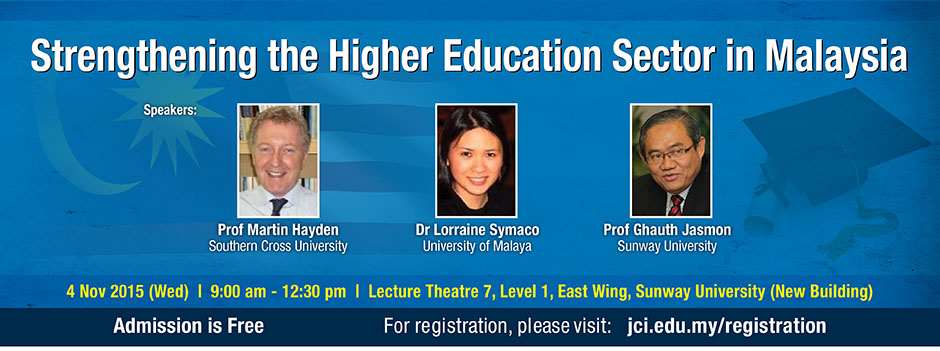
November 12, 2015, by Blog Administrator
Some thoughts on “Strengthening the Higher Education Sector in Malaysia”, a JCI (SEA) event
I had the opportunity to attend an interesting seminar, organised by Jeffrey Cheah Institute on SouthEast Asia at Sunway University College recently. Titled “Strengthening the Higher Education Sector in Malaysia”, the seminar focused on bringing new issues and perspectives into Malaysian education system by drawing experience and lessons from three countries, with speakers from Australia, Philippines and from Malaysia.
I had looked forward to this seminar because it is a chance for me to be able to visit other local Malaysian higher education institutions, and also to expand my knowledge on the state of Malaysian education system, given how it has gone flip-flopping over the years at the school level. Despite the obstacles it faced, the education system in Malaysia then and now has always been a federal matter, regardless whether it is at the school or tertiary level.
Moderated by Prof Woo Wing Thye, it was a lively seminar where it focuses on three key themes that can influence a country’s education system. They are:
- How important it is to have a good skills development from home,
- The impact of natural disaster on a nation’s education and
- How implementation and good governance is vital to ensure that Malaysia successfully transformed itself into a major education hub of the region.
Professor Martin Hayden mentioned in his talk there are emerging skills problems for the workforce in Asian countries because there are skill gaps, shortages and mismatches in education systems that do not provide for a nation’s needs. A report by Asian Development Bank (2015) shows that developing Asia has done well at increasing access to education. However, it lacks the focus on providing quality education to ensure that its workforce has matching skills to transform the region into economic prosperity. He emphasized the importance of having good skills training from young, at both home and school level to create a good foundation for students as they progressed in each level of studies.
The next speaker, Dr Lorraine Symaco spoke about the importance of implementing a successful education which is corruption and disaster free for a country’s development. Using her home country, Phillippines as a case study example, she showed the audience pictures of children at home (and within the region) having to go through hardships and dangerous mode of travel to attend school. She shared with us on the realities of the education system in Phillippines, where it is affected, governed and implemented by controllable and uncontrollable forces such as the continuous natural disasters, corruption, education in conflict areas, and limited access to education.
Dr Symaco reminded the audience (majority Malaysians) that we should be thankful for the situation that we are experiencing despite the negative information that is widely spreading on social media and other media channel. According to her, compared to children back at home, we Malaysians are luckier because we need to rework our education system and managing it effectively through any new policy implementation. We must also be constantly asking ourselves “What type of education we want for our children?” and not fight about unnecessary matters that will affect education policy.
The third and last speaker, Professor Ghauth Jasmon lectured about realizing the idea of Malaysia as a successful regional education hub. The topic drew a polite chuckle from the audience (who are also majority Malaysian parents as well) given how disputed the topic on Malaysian education has been on the Malaysian media. He focused his points towards the impact of budget cuts in higher education by 15% from the recently announced Malaysia 2016 budget. He drew the attention on how the cuts will affect the 10 shifts introduced in the Malaysian Education Blueprint (HE) 2015-2025. Historically, the country’s national budget allocation for higher education has been on the declined rate for the past six years (since 2010). The decline according to him should not be affecting Malaysia HEIs drastically if all universities senior management (specifically the public universities) have a clear institutional strategy and entrepreneurship direction.
Change and innovation have been happening in Malaysian education system since its independence in 1957. What is clear that consistent policy changes are required at the foundation (school) level and gradually building it until the tertiary level. The main problem with overall Malaysian education system is there is too much interference from politics. At the school level, schools will be divided along racial lines. This will continue until the tertiary level where access to education will continue to be unequal in many areas because scholarship, access to good ranking institutions are all government-run and abused by the decision makers through their ‘nation-building programmes’.
To ensure the success of a better Malaysian education system, the government needs to put aside their differences while working towards achieving the goal of improving the quality of education. Politics needs to be taken out of every decision making and not waste too much time debating on what benefits one ethnic group over the other. Listening to the three speakers sharing their knowledge, experience and suggestion for best practices made me realised that a well-structured national policy can be done. It is a matter whether we want to be creative and realistic in increasing equality to education through strategic implementation and strengthening them at the national level. After all, the ultimate goal is still to ensure that the Malaysian youths are equipped with skills that enable them to compete at the global level and be well-rounded global citizens.
Useful links:
http://www.adb.org/publications/key-indicators-asia-and-pacific-2015
http://www.emeraldinsight.com/doi/full/10.1108/09578239810238456#_i5
https://hornbillunleashed.wordpress.com/2013/05/15/45687/
http://www.themalaysianinsider.com/malaysia/article/education-system-in-need-of-drastic-radical-change-says-ku-li
http://m.malaysiakini.com/news/317029
https://www.studymalaysia.com/education/higher-education-in-malaysia/the-malaysian-higher-education-system-an-overview
http://www.academia.edu/8549539/Educational_Development_and_Reformation_in_the_Malaysian_Education_System_Challenges_in_the_New_Millennium
Yeong Woon Chin is currently the Research & Executive Administrator for Knowledge Without Borders Network and a Ph.D. candidate in the Faculty of Arts & Social Sciences at The University of Nottingham Malaysia Campus.
No comments yet, fill out a comment to be the first

Leave a Reply